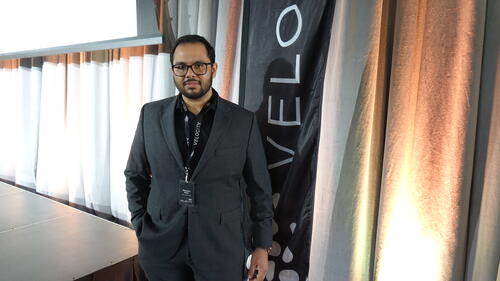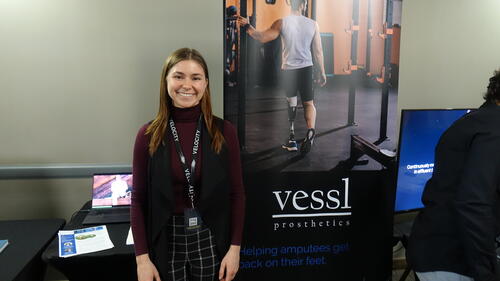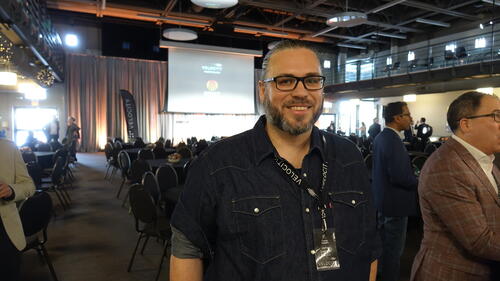
Waterloo’s globally recognized startup program Velocity launched an initiative – Velocity Health – that aims to help new companies in the health-tech sector access funding and get products and services in the hands of those who need them.
Velocity Health was officially launched today at a kickoff event at the University of Waterloo. The latest stream of the Velocity suite of platforms was created to address the key challenges health-tech startups face.
“I’m inspired to see and hear how Velocity Health is taking shape,” said Dr. Vivek Goel, president and vice-chancellor of the University of Waterloo. “Velocity is helping to expand the impact and scope of the University of Waterloo and positioning our region as a global leader in addressing future health challenges.”
Partners involved with Velocity Health alongside UWaterloo include the Grand River Hospital Foundation, the Accelerating Clinical Trials Consortium at McMaster University, the IMPACT program at the University of Calgary, the Medical Innovation Xchange, the University of Western Ontario and the MaRS Discovery District.
Velocity Health is funded in part by the Government of Canada through the Federal Economic Development Agency for Southern Ontario (FedDev Ontario) and supported by the City of Kitchener.
These partnerships and Velocity’s support will improve Canadians’ quality of care, advance Canadian entrepreneurship globally and connect and grow Canada’s innovation economy.
Accelerating health technology
“There are two main gaps in the health-technology realm right now,” said Moazam Khan, director of Velocity Health and Science alumnus (BSc. ‘16). “One is slow adoption by the sector of new and emerging technologies. The other is fundraising for early-stage health technology companies.”

Moazam Khan, director of Velocity Health and Science alumnus (BSc. ‘16, MBET ‘17).
Khan says that by being part of Velocity Health, new startups can get early-stage validation of their products and services, as well as a range of support and resources throughout the company’s lifecycle, from ideation to clinical trials, market validation and commercialization.
“We’re creating a community of health technology founders. It’s founders helping founders,” Khan continued. “Velocity Health is one of Canada’s first health-technology commercialization platforms. We’re establishing pan-Canadian partnerships so Canadian health-tech companies can tackle the global market.”
Khan is a serial entrepreneur with a background in medical science, business and technology and has experience in launching and scaling companies, including Velocity Alumni Curiato.
Vessl Prosthetics
One of the health-tech companies at Velocity is Vessl Prosthetics. The company is setting out to make auto-adjusting prosthetics for amputees.
“What we identified was that amputees’ legs will change size inside of a socket that never changes size,” said Sydney Robinson, CEO and co-founder of Vessl. “That can create pressure extremes that often lead to blisters. What we’ve developed is an automatically adjusting prosthetic socket to help with comfort and fit.”

Sydney Robinson, CEO and co-founder of Vessl Prosthetics.
Robinson said that the company is actively working with amputees and amputee organizations in every stage of product development. Inclusion is a driving force and “input from amputees is the best way to understand the problems they face.”
Cauchy Analytics
Another Velocity health-tech company is Cauchy Analytics, which bills itself as the world’s first analytics platform for medical imaging.
“We are miniaturizing and automating ultrasound sensors to collect data and improve patient outcomes,” said James Lowman, Cauchy’s CEO. “Ultrasound has always been developed, such that you’re making an image for a doctor to interpret. But we know that computers can see a lot more than any human can. So, we’re adapting ultrasound to try and cover that gap.”

James Lowman, CEO of Cauchy Analytics.
Lowman said that Velocity has been instrumental in the company’s early stages, both in terms of direct support and as a space where they can interact with other founders. “We have great advisors who know all about health-tech and how to navigate as a company trying to change things,” Lowman continued.